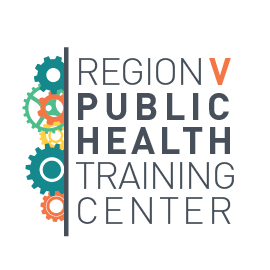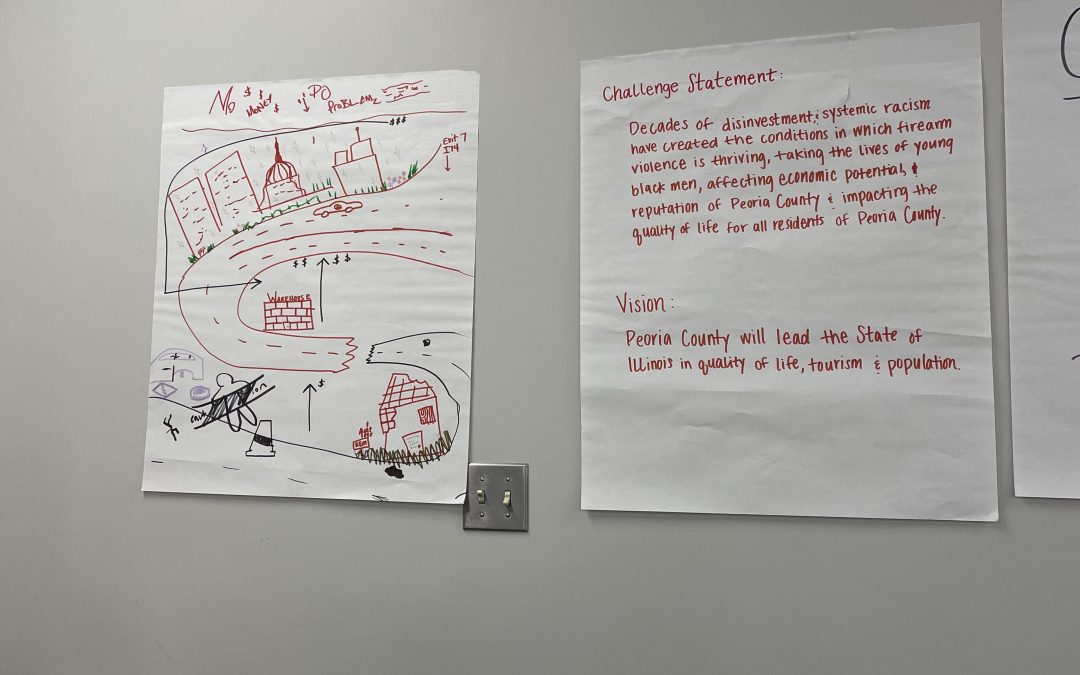During the Leadership Institute’s first session, facilitators guided Peoria City and County Health Department staff through a rich picture exercise to bring attention to creatively uncover systems change opportunities to address their adaptive challenges.
By Sarah Kerch, MPH, Assistant Director for Leadership, Organizational Change, and Workforce Development and Amber Uskali, MPH, Assistant Director for Evaluation, Translation, and Dissemination, University of Illinois Chicago Policy, Practice and Prevention Research Center
The Public Health Leadership Institute for System Change (PHLISC) pilot works with public health professionals to develop solutions to complex problems.
Between 2017 and 2021, approximately half of the public health workforce at state and local health departments nationwide left their jobs. In addition to the declining workforce, the issues faced by public health professionals have grown evermore complex, further exacerbating health inequities. Illinois is no exception, and a review of state-specific datai suggested that Illinois’s approach to address these complex problems should include an expansion of leadership capabilities across its public health workforce.
The Policy, Practice and Prevention Research Center (P3RC) is working with staff from the Peoria City and County Health Department (Peoria HD) to build their leadership capabilities by unpacking the challenges faced by their communities. The collaboration between the P3RC and Peoria HD is part of a project, Strengthening Illinois’ Public Health System and Workforce, in partnership with the Illinois Department of Public Health. The 5-year project is funded through the CDC’s Public Health Infrastructure Grant.
Through three facilitated in-person sessions, additional team discussions, and coaching calls, the P3RC and staff are working with the Peoria HD to pilot the Public Health Leadership Institute for Systems Change (PHLISC). The first in-person session was held in December 2023, with the final pilot session scheduled for July 2024. The pilot PHLISC builds upon the lessons learned from the National Pilot of the Public Health Learning Agenda to explore potential root causes of these challenges and generate solutions. Nine cross-functional teams from the Peoria HD are exploring a variety of different issues faced by their department or community, including high blood lead levels, violence reduction, community trust in public health, workforce development, and high rates of STIs. Team discussions and coaching calls between in-person sessions seek to support each team as they uncover the complex and multifactorial challenges causing the surface-level issue. The iterative process between and during in-person sessions is designed to also identify possible assets to catalyze change and anticipate any potential resistance or barriers to implementing their work.
The PHLISC Pilot utilizes the Public Health Learning Agenda Framework, which was developed by the Public Health Training Center Network.
Partners who engage in the Learning Agenda gain an understanding of the systems change process. If successful, PHLISC will provide participants with experience and tools needed to address other challenges and their associated root causes. After the pilot, which ends in July 2024, the P3RC plans to roll out the PHLISC in additional Illinois communities to increase the public health workforce capability and address increasingly complex challenges across the state.
i Data sources include: Listening sessions with Illinois Department of Public Health staff and local health departments, UIC P3RC (2023); Illinois Department of Public Health Training Needs Assessment Survey, Illinois Department of Public Health (2023), Region V Public Health Training Center Survey, adapted for the Illinois Department of Public Health, UIC P3RC (2023); Draft 2025 Illinois State Health Improvement Plan (2024); and Public Health Workforce Interest and Needs Survey, Illinois, de Beaumont Foundation (2021 and 2016).
To learn more, check out these resources:

